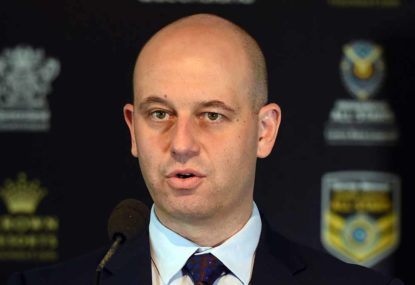Brad and Bennett: Why Friday's clash with the Dolphins might be a tipping point for Arthur and the Eels
Friday night’s clash between Parramatta and the Dolphins is likely to be a hot one – and not just because the game is being…

As we gear up for another weekend of NRL, it is understandable that some of us are a little exhausted after the emotion of Wednesday’s State of Origin opener in Sydney.
The Origin juggernaut continues to demolish everything in its path, with Wednesday’s broadcast hitting a ratings home run, attracting record viewers of over four million nationally.
This builds on the success of last year’s series, with Game 2 the most watched show of the year, and Origin broadcasts making up two of the top three programs nationally in 2015.
Meanwhile, coaches continue to bemoan the impact the series has on the regular season, with Des Hasler summarising the thoughts of many after his Bulldogs were trounced by the Canberra Raiders last weekend.
“It’s almost as if you’re playing second fiddle to what Origin is about, which is not a good a thing. There’s too much investment of money and time for this to happen.”
Indeed, anyone with even a casual office tipping comp knows the impact that Origin plays with matches over the five-week period. Last week’s games show how hard it is to predict the outcome of matches where teams have been stripped of their key playmakers – the barnstorming Broncos (missing six players) were upset by the lowly Tigers (missing two), while the premiership-winning Cowboys (missing five players) were edged out by the Dragons (missing two).
In a competition as even as the NRL, losing two matches due to depleted rosters can cost teams finals appearances, and no head coach or CEO wants to deal with the consequences of that.
Add to this the intangible damage the Origin series has on the competition and it creates an intriguing question. Is Origin impacting the integrity and credibility of the NRL, as insinuated by Bulldogs chief executive Raelene Castle during the week?
The evidence is sketchy – last week’s Round 12 Sunday match, Canberra versus Canterbury, drew 336,000 free-to-air viewers, up on Round 11’s corresponding Bulldogs versus Roosters match of 317,000. Across both free-to-air and subscription services, while total viewers were down due to the reduced number of games, individual game ratings remained fairly consistent despite Origin’s massive shadow.
Yet despite our insatiable demand for TV, Origin clearly creates a physical and emotional hangover for fans. Even after the Origin series ends, there are still eight more regular season rounds until we reach the finals. Add to this the injuries that come from Origin’s notorious physicality, and momentum is understandably affected.
So what are the alternatives?
The NRL is already exploring a stand-alone weekend concept which will go some way to minimising the impact Origin has on depleted teams. From next year, the NRL is moving the second Origin game to a Sunday night as part of a ‘representative round’ where regular season games are halted.
This is a concept that is similar to rugby’s approach. The Super Rugby competition pauses for one month each year for a series of June international games, removing the impact of weakened squads from the regular competition.
Yet while this solves the problem of absent players, it also halts the competition’s momentum even further. As The Roar pointed out earlier this week: “just as this [Super Rugby] soup has deliciously come to the boil, it is now set aside; not for tasting again for another month”.
Across the Pacific, the NFL’s Pro Bowl uses the weekend before the Super Bowl to showcase its range of superstars. This gives Super Bowl teams a week off and allows a festive build-up to the big game. The only problem is that, aside from being more of an exhibition game, the Pro Bowl excludes players playing in the Super Bowl itself – imagine trying to pick an Origin team with no Broncos or Cowboys players (maybe not a bad thing if you’re a NSW fan).
Perhaps a more viable alternative would be to allow the season to run its length and then move the representative matches until after the grand final. This has been espoused by many, and would maintain the momentum of the regular season, while ensuring teams had a full complement of players available for critical games.
The downside here is that it could conversely remove some of the aura around Origin, the game’s biggest money-spinner. It also raises problems from a team selection perspective. The current format allows teams to pick players in peak form and in the public eye. Postponing Origin until after the season would mean players from teams outside the finals series would have a month of uncertainty as to whether they were playing or not.
And finally, from a timing perspective, postponing Origin until the end of the season would stretch an already long season further towards the end of October, something unlikely to be palatable to players.
It is clear that the NRL has a tough task to solve Origin’s scheduling conundrum and make everyone happy.
With Origin ratings continuing to break records in the face of numerous rugby league scandals, it’s also probably not a problem Todd Greenberg minds having at the moment.